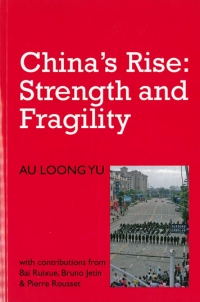Not available

China's rise – Strength and Fragility is the first book being jointly published by Resistance Books, the IIRE and Merlin Press. Author Au Loong Yu will be visiting Britain from 12 to 22 November to launch the book at meetings around the country.
The book looks at the dramatic political and economic developments in China from a Marxist perspective. It argues that to understand China today it is also necessary to study the Chinese revolution and it describes the unique social formation that exists today in China as bureaucratic capitalism.
By examining the specificities of Chinese society, and the struggles for democracy and for improved conditions, the authors show that Chinese bureaucratic and repressive capitalism is beginning to exhaust its strength. China is increasingly relying on rapidly expanding public debt. Struggles by Chinese workers suggest that they are beginning to overcome the demoralization inflicted by the crushing of the democracy movement of 1989 and that they are building up their confidence to fight against this unjust system.
Anyone seeking to understand today's globalised world has to contemplate the gigantic presence of China with its unprecedented economic development since the crushing of the democracy movement at Tiananmen Square in 1989. In the thirty years from 1978 – 2009, with an average growth rate of 9.9 per cent, China's GDP grew 18-fold. Such a continuously high growth rate has not been matched by any country in the world in contemporary times. This enabled it to transform itself from a vast, largely peasant country into a significantly urbanised society It is now the world's largest exporter and manufacturer and the second largest economy.
Capitalism has been fully restored in this vast country but the Chinese Communist Party remains as monolithically in control as ever – a very different story to what has happened in the former Soviet Union since the fall of the Berlin Wall. In the mid-1980s the Chinese Communist Party under Deng Xiaoping adopted a policy of aggressive privatization, led by state and party officials who profited directly through the process. Over 40 million workers in the state sector were sacked in the mid-1990s and replaced with migrant workers from rural China employed on worse conditions in barracks-like factories.
Workers' struggles have broken out which are reminiscent of Europe when the industrial working class was first born – though comparisons with other developing countries make more sense. It is not just workers taking action – there are also community struggles over the ecological devastation being brought about by this brutal and environmentally destructive model of industrialization and economic expansion.
It is not just the 1.3 billion people who live in China whose futures will be at the very least profoundly affected by the future of such struggles – but all of those who live on this increasingly interdependent planet. If China seems to be everywhere in the media at the minute, this speaking tour offers a unique opportunity to find out more.
China's rise – Strength and Fragility is the first book being jointly published by Resistance Books, the IIRE and Merlin Press. Author Au Loong Yu will be visiting Britain from 12 to 22 November to launch the book at meetings around the country.
The book looks at the dramatic political and economic developments in China from a Marxist perspective. It argues that to understand China today it is also necessary to study the Chinese revolution and it describes the unique social formation that exists today in China as bureaucratic capitalism.
By examining the specificities of Chinese society, and the struggles for democracy and for improved conditions, the authors show that Chinese bureaucratic and repressive capitalism is beginning to exhaust its strength. China is increasingly relying on rapidly expanding public debt. Struggles by Chinese workers suggest that they are beginning to overcome the demoralization inflicted by the crushing of the democracy movement of 1989 and that they are building up their confidence to fight against this unjust system.
Anyone seeking to understand today's globalised world has to contemplate the gigantic presence of China with its unprecedented economic development since the crushing of the democracy movement at Tiananmen Square in 1989. In the thirty years from 1978 – 2009, with an average growth rate of 9.9 per cent, China's GDP grew 18-fold. Such a continuously high growth rate has not been matched by any country in the world in contemporary times. This enabled it to transform itself from a vast, largely peasant country into a significantly urbanised society It is now the world's largest exporter and manufacturer and the second largest economy.
Capitalism has been fully restored in this vast country but the Chinese Communist Party remains as monolithically in control as ever – a very different story to what has happened in the former Soviet Union since the fall of the Berlin Wall. In the mid-1980s the Chinese Communist Party under Deng Xiaoping adopted a policy of aggressive privatization, led by state and party officials who profited directly through the process. Over 40 million workers in the state sector were sacked in the mid-1990s and replaced with migrant workers from rural China employed on worse conditions in barracks-like factories.
Workers' struggles have broken out which are reminiscent of Europe when the industrial working class was first born – though comparisons with other developing countries make more sense. It is not just workers taking action – there are also community struggles over the ecological devastation being brought about by this brutal and environmentally destructive model of industrialization and economic expansion.
It is not just the 1.3 billion people who live in China whose futures will be at the very least profoundly affected by the future of such struggles – but all of those who live on this increasingly interdependent planet. If China seems to be everywhere in the media at the minute, this book tour offers a unique opportunity to find out more.
